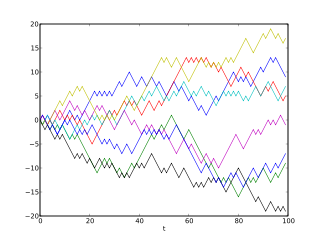Consider a sequence $(X_i)_{i = 1}^{\infty}$ which every $X_i$ is $-1$, $0$ or $+1$ and lets define $Y_n = X_1+ \cdots + X_n$. We say the sequence $(X_i)_{i = 1}^{\infty}$ a Good Sequence if $Y_n \neq O( n^{\frac{1}{2} } )$ but for every positive real $\epsilon$, $Y_n = O( n^{\frac{1}{2} + \epsilon} )$.
My question:
- Do you know a good sequence which can be described with an explicit formula?
Notes:
It's not so hard to create a good sequence but I mean, that I want one of them which can be described with an explicit formula (algebraic formula or ... ).
A candidate is the Möbius function. But the proof of that which $(\mu(n))_{n = 1}^{\infty}$ is good is equivalent with Riemann-hypothesis.
Almost surely every random walk (of usual ones) is a good sequence.
(This note added after the first comment which solved the problem and I found which there are some solutions which are different from that which is in my mind and in this comment I've tried to draw the thing which I want a solution to be that) Mainly, I want a deterministic and explicitly described walk which is like random walks, and in other terms I want a deterministic and explicitly described walk which its graph is like the graph of random walks (The below image is from Wikipedia.org).

